Best AI Search Engines in 2025 — Which One Fits Your Needs?

Discover the best AI search engines in 2025—Perplexity, Brave, Consensus, Komo, and Phind. Compare features, pricing, privacy, accuracy, and get answers to common FAQ like “Which AI can browse the internet?” and “How to turn on Google AI Search.”
Remember when we almost automatically turned to Google or Bing for every single question? Fast forward to 2025, and many people feel traditional search engines just don’t cut it anymore.
- Too many ads cluttering the top results.
- SEO spam everywhere, burying the real answers.
- Declining trust, forcing you to cross-check multiple sites before you’re confident.
That frustration has opened the door to a new kind of tool: AI-powered search engines. Instead of giving you a long list of links, they provide direct, conversational answers, often with summaries, citations, and real-time updates.
But here’s the catch: not all AI search engines are created equal. Some shine at everyday questions, others specialize in academic research, and some put privacy first. Reliability also varies—while one tool may nail a fact, another could hallucinate or misquote sources.
This guide is here to help you cut through the noise. I’ve tested the most talked-about AI search engines of 2025 and will show you:
- Which tool is best for your specific needs.
- How they compare in terms of accuracy and reliability.
- What you get in the free vs paid versions.
By the end, you’ll know exactly which AI search engine deserves a spot in your daily workflow.
What Makes a Good AI Search Engine?
Not every AI search engine is worth your time. With so many new tools popping up, it helps to know what actually separates the great ones from gimmicks.
Here are the key qualities that make an AI search engine genuinely useful:
- Natural language understanding — You should be able to type a question the same way you’d ask a friend, without worrying about keywords.
- Clear, concise answers — No more scrolling through 10 blue links. A good AI search engine gives you a direct summary with the option to dive deeper.
- Citations and transparency — Where is the information coming from? Reliable engines back up their responses with sources you can check.
- Follow-up friendly — The best ones let you refine or expand your query in conversation, rather than starting over each time.
- Real-time awareness — For breaking news, events, or fast-changing facts, a strong AI tool can pull in up-to-date information.
And of course, there’s one quality that stands above the rest:
- Accuracy and trustworthiness — Fancy features mean little if the search engine regularly makes mistakes, invents facts, or pulls from low-quality sources.
In short, the best AI search engines don’t just save you time—they give you confidence that the answer in front of you is worth trusting.
Which AI Search Engine Fits Different User Needs?
AI search engines don’t feel the same when you actually use them. Beyond accuracy and features, the experience of typing a query, reading answers, and following up can completely change how useful the tool feels. Here’s a closer look, with user experience included.
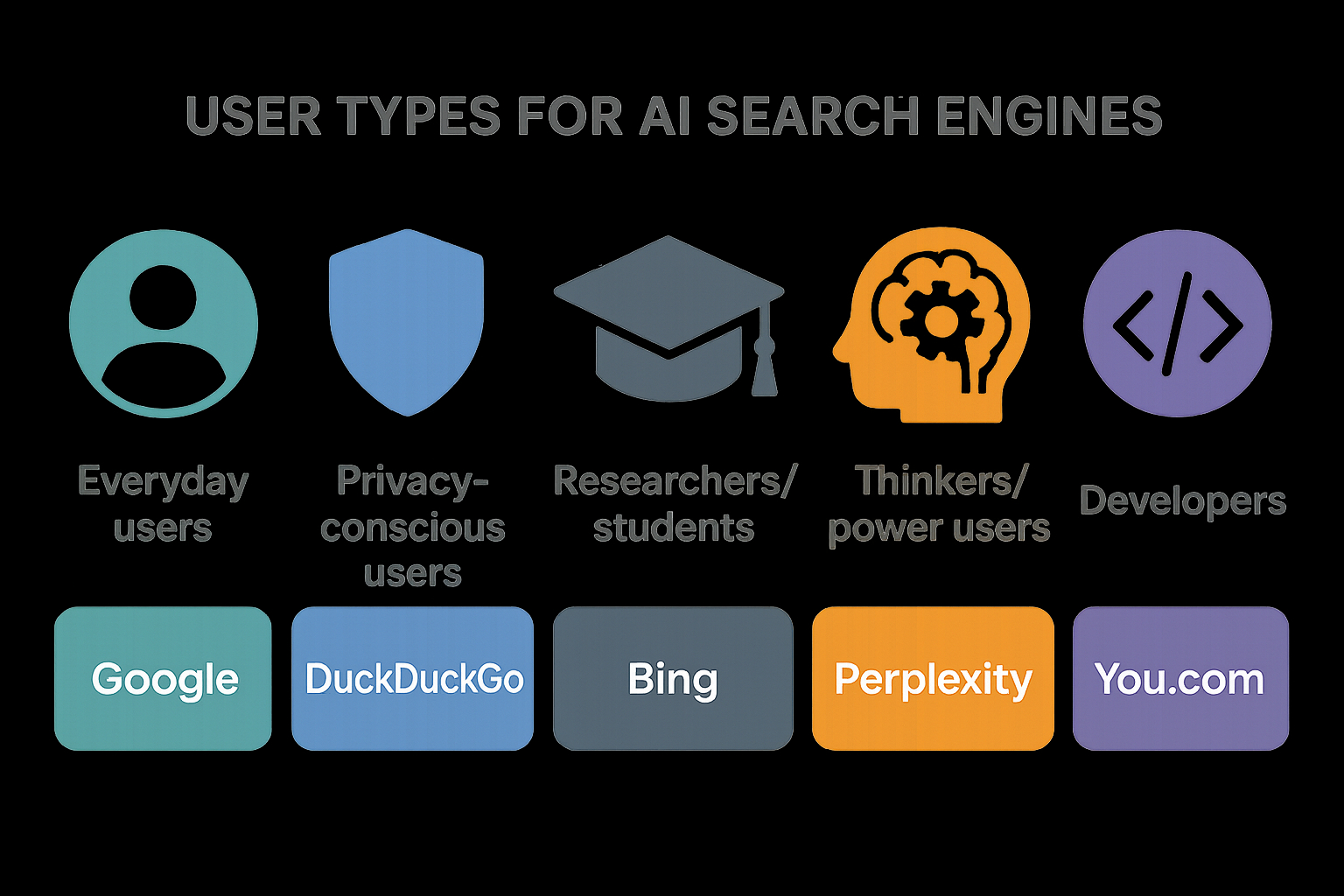
Perplexity - for everyday users
Using Perplexity feels a lot like texting a smart, well-read friend. Answers load fast, the layout is clean and uncluttered, and follow-up questions continue naturally in the same thread. Compared to Google, you spend less time clicking around—and more time actually getting an answer.
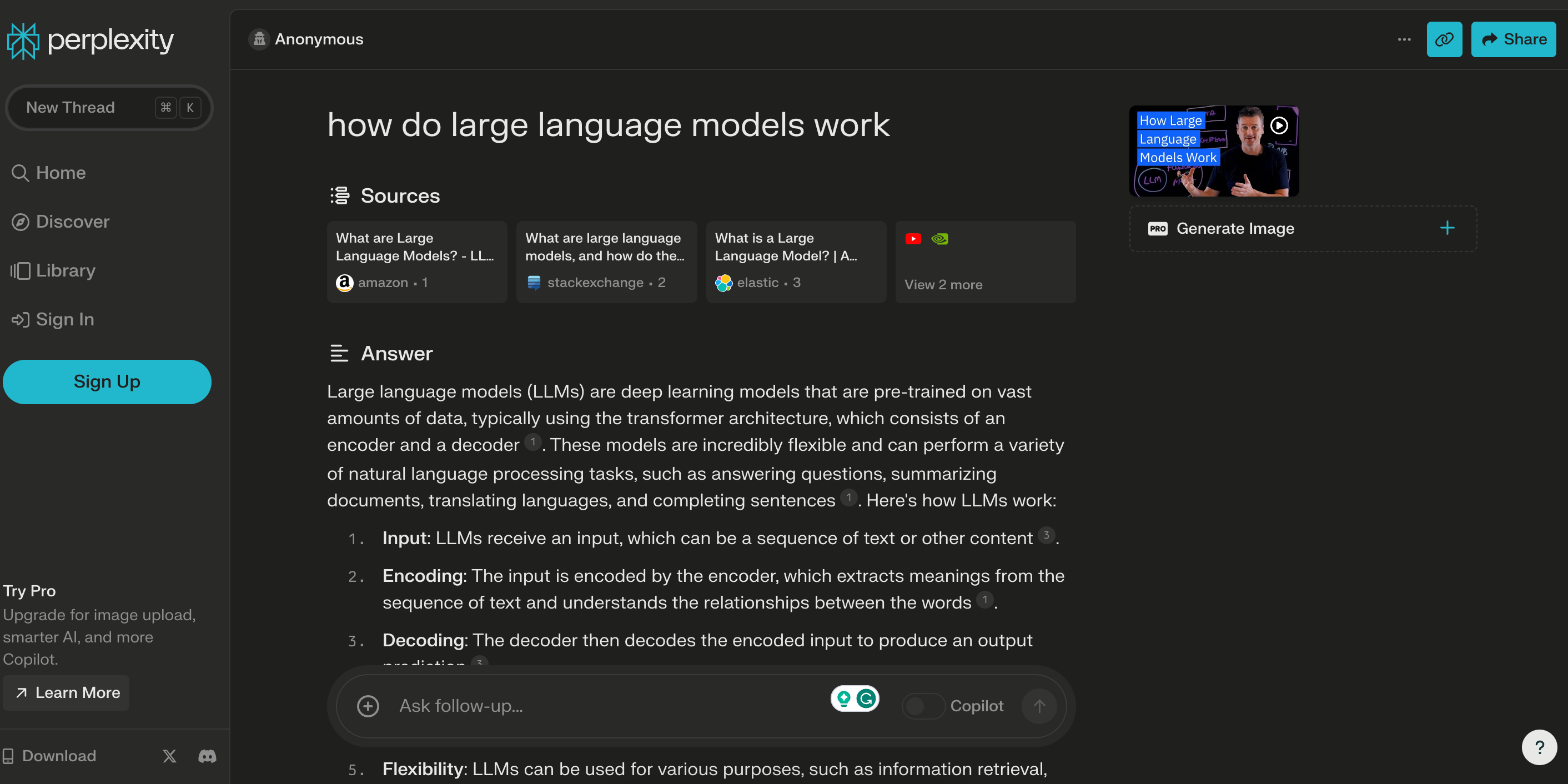
Strengths:
- Handles natural questions like “What’s a 10-day itinerary for Italy with local food spots?” and gives a polished, well-organized answer.
- Updates with real-time events, great for checking the latest news or sports.
- Provides citations so you can click and verify sources.
Limitations:
- Free plan limits how many queries you can ask per day.
- Sometimes AI builds overly confident claims from weak sources.
Best for you if… you want a trustworthy, everyday replacement for traditional search.
Brave Search - for conscious users
Brave feels almost like a minimalist version of Google. If you’re used to being overwhelmed by ads and trackers, Brave is a relief—search is fast, text-heavy, and distraction-free. The AI summaries sometimes feel “robotic,” but for privacy-first users, the overall peace of mind outweighs the quirks.
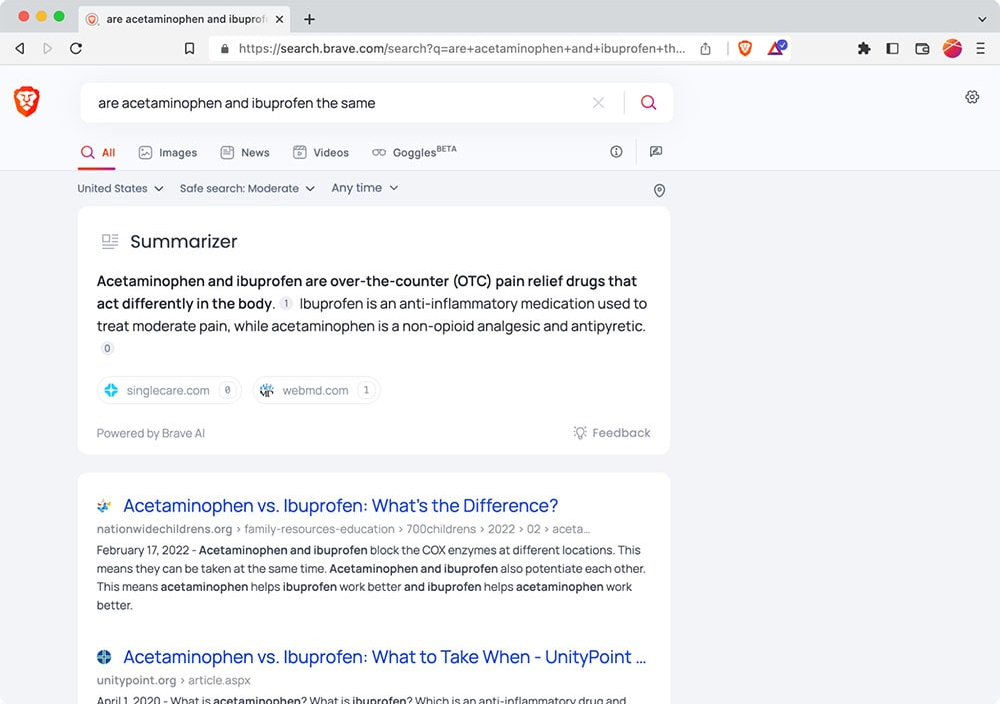
Strengths:
- Independent index (not reliant on Google/Bing).
- AI “Summarizer” quickly condenses results into a useful paragraph.
- No ads or data tracking—aligned with Brave’s privacy-first reputation.
Limitations:
- Search results can feel sparse for unusual or niche queries.
- AI summaries are less smooth compared to Perplexity.
Best for you if… you want to search with zero tracking or profiling, without sacrificing AI support.
Consensus - for researchers and student
Consensus feels almost like a supercharged Google Scholar but simplified. Instead of reading through 15 PDFs, you get a digestible overview in plain English, with the option to dive into the original studies. For students, it feels like the difference between spending 30 minutes vs 3 hours on a single question.
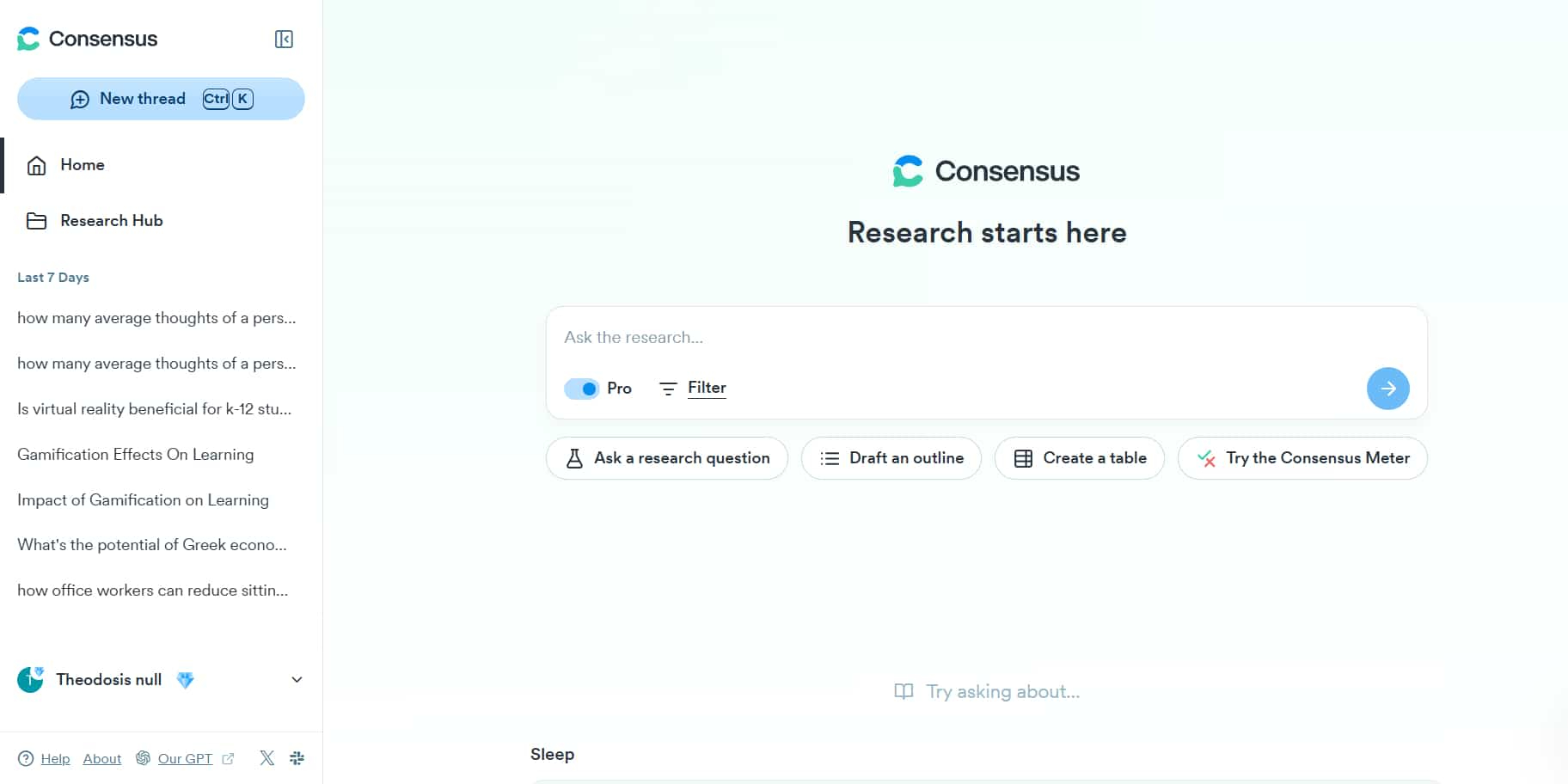
Strengths:
- Scans peer-reviewed sources for evidence-based answers.
- Summarizes findings with counts (e.g., “8 studies support, 3 show no effect”).
- Provides clickable links to studies for your own review.
Limitations:
- Limited to research fields—bad at casual or lifestyle queries.
- Coverage depends on available academic content.
Best for you if… you need reliable, citation-rich answers for academic or scientific work.
Komo - for thinkers and power users
Komo feels like sitting in front of a control panel for search. If you enjoy tweaking dials and experimenting, it’s fun—you can ask the same question in two different “modes” and compare answers. But if you just want a quick, polished reply, the rough edges might frustrate you.
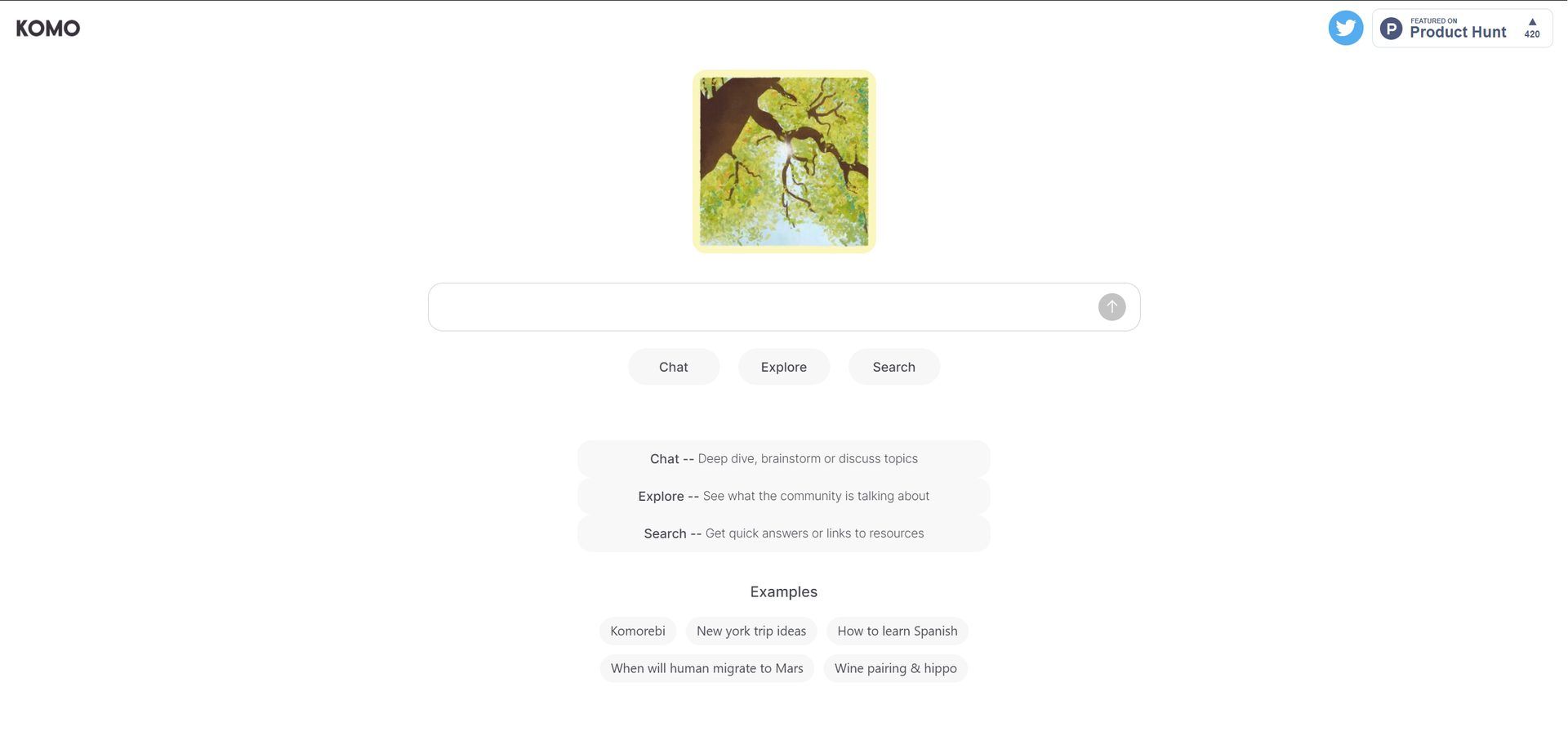
Strengths:
- Lets you switch AI personas for different answer styles (concise, creative, explainer).
- Gives you freedom to test multiple AI models side by side.
- A “playground” for users who don’t want one-size-fits-all answers.
Limitations:
- Still in the early stages; output can be inconsistent.
- Less reliable in core fact-checking compared to Perplexity or Brave.
Best for you if… you’re a curious tinkerer who enjoys experimenting with how AI responds.
Phind - for developers and tech enthusiasts
Phind feels like a knowledgeable coding mentor sitting beside you. You paste in a block of cryptic Python error messages, and it patiently explains what’s wrong and how to fix it. It’s not for everyday queries, but if your world revolves around debugging and learning frameworks, it’s highly addictive.

Strengths:
- Exceptional at explaining code and frameworks with real examples.
- Provides context-aware answers, often better than Stack Overflow.
- Built for software engineers and technical learners.
Limitations:
- Weak in general search (travel, news, lifestyle).
- Not built for non-developer use cases.
Best for you if… you’re a developer or technical learner who values detailed, practical coding help.
AI Search Engines Compared (2025)
Product | Best For | Strengths | Limitations | User Experience | Pricing |
Perplexity | Everyday users (Google alternative) | - Conversational answers<br>- Real-time updates<br>- Clear citations | - Daily query cap on free plan<br>- Sometimes overconfident with weak sources | Feels like chatting with a smart friend. Fast, clean, conversational, less time spent clicking links. | Free plan (limited queries); Pro: ~$20/mo for unlimited use + GPT‑4/5 tier |
Brave Search | Privacy-conscious users | - Independent index<br>- AI “Summarizer” + traditional links<br>- No ads, no tracking | - Sparse results for niche queries<br>- AI feels less polished | Like a minimalist Google. Clean, distraction-free, with peace of mind from zero tracking. | Free; Premium AI features optional (~$3–10/mo) |
Consensus | Students & researchers | - Evidence-based summaries<br>- Shows supportive vs. opposing studies<br>- Direct links to papers | - Poor for casual queries<br>- Limited by available research | Feels like a supercharged Google Scholar. Cuts hours of reading into clear, digestible summaries. | Free basic version; Pro: ~$9–15/mo with more queries & advanced filters |
Komo | Tinkerers & power users | - AI personas & customization<br>- Multiple models to test<br>- Flexible playground | - Inconsistent outputs<br>- Can be unreliable on facts | Like a control panel for AI search. Fun for experimenting, but may feel rough for quick answers. | Free to try; paid tiers vary (~$10–20/mo) depending on model usage |
Phind | Developers & tech enthusiasts | - Excellent at coding Q&A<br>- Step-by-step explanations<br>- Up-to-date with frameworks | - Weak outside of tech<br>- Niche audience only | Like having a personal coding mentor. Great for debugging, addictive for learning frameworks. | Free basic use; Pro: ~$10–20/mo for faster & higher limits |
Conclusion
AI search engines are no longer experiments—they’re becoming everyday tools. Whether you care most about privacy, academic rigor, customization, or speed, there’s now a reliable option designed for you.
The key is not asking “Which AI search engine is best?” but rather “Which AI search engine is best for me?”
- Use Perplexity if you want a friendly, everyday replacement for Google.
- Use Brave if privacy and independence matter most.
- Use Consensus if your work depends on trustworthy, research-backed insights.
- Use Komo if you enjoy experimenting and customizing your search.
- Use Phind if you’re a developer who needs deep technical guidance.
In the near future, AI search isn’t about finding one winner—it’s about building a toolkit you can trust. By knowing which engine to reach for in each situation, you’ll move faster, make better-informed decisions, and step ahead in the AI-powered world of 2025 and beyond.
FAQ: AI Search Engines in 2025
Can AI search engines completely replace Google or Bing?
Not yet. For everyday queries, engines like Perplexity do a great job. But for very broad searches (maps, shopping, local services), traditional giants still hold an advantage. The smarter approach is using both—AI for answers, Google for navigation.
How do I turn on Google AI Search?
Google’s experimental AI results—often called Search Generative Experience (SGE)—are gradually being rolled out. If available in your region, you’ll see an option in Google Search Labs (in the Google app or Chrome browser). Toggle it “on” to enable AI-powered results.
Which AI is totally free?
Several options offer free access:
- Brave Search: 100% free with its AI Summarizer.
- Consensus: Core features are free, but Pro is paid.
- Komo and Phind: Free for lighter use, but limits apply.
Keep in mind: “completely free” usually comes with daily caps or slower speeds.
How to use AI to find a person?
AI search is not designed for private person-finding (that raises privacy and ethical concerns). But you can safely:
- Use it to gather publicly available information (e.g., experts, authors, researchers).
- Look up a person’s work, publications, or interviews if they’re in the public domain.
⚠️ Avoid trying to use AI for personal data on private individuals—it’s neither reliable nor safe.
Which AI can browse the internet?
- Perplexity: Actively crawls the web and keeps results up-to-date.
- Brave: Runs on its own index with AI summaries.
- Phind: Strong for web-accessed programming resources.
- Consensus: Limited to academic papers only (not general web).
Which AI search engine is the most accurate?
No tool is 100% accurate, but Consensus has the strongest reliability because it pulls directly from peer-reviewed research. For general-purpose accuracy with citations, Perplexity performs best.
Are AI search engines safe for student research?
Yes—with caution. Tools like Consensus are designed for evidence-based queries and offer direct citations. But teachers and professors usually expect primary sources, so always double-check and cite the original paper rather than just the AI summary.
What about privacy—will AI search engines track me like Google does?
It depends. Brave Search is currently the leading privacy-first option, with no data tracking. Perplexity collects some usage info to improve the product, while Google’s AI experiments are still deeply tied to its ad business. If privacy is your top concern: choose Brave.
How much do they cost?
- Perplexity: Free with limited queries; Pro version around $20/month.
- Brave: Core features free; AI extras ~$3–10/month optional.
- Consensus: Free tier; Pro ~$9–15/month with higher query limits.
- Komo: Free trials; paid tiers ~$10–20/month depending on usage.
- Phind: Free basic plan; Pro ~$10–20/month for faster, uncapped searches.
Can AI search engines keep up with breaking news?
Yes, but only some. Perplexity and Brave pull in current news sources and provide real-time updates. Consensus, on the other hand, only works with published research, so it’s not ideal for breaking headlines.
What’s next for AI search?
Expect a shift from just answering questions to actually taking actions—booking, comparing, or even making recommendations tailored to your needs. At the same time, accuracy and transparency will be the biggest deciding factors for trust.
Relative Resources

Jungle Scout vs. Helium 10: What Real Sellers Are Saying in 2025

Best SMS Apps in 2025: The Ultimate Guide to Smarter Texting

Best Font Generator: How to Transform Your Text Into Creative Magic

The Ultimate Guide to AI Email Tools: Are You Missing Out?
Latest Resources

Moltbook: Where 150K AI Agents Talk Behind Our Backs

How to Bypass CAPTCHA in 2026: Complete Guide & Solutions

Moltbot (Clawdbot) Security Guide for Self-Hosted AI Setup

